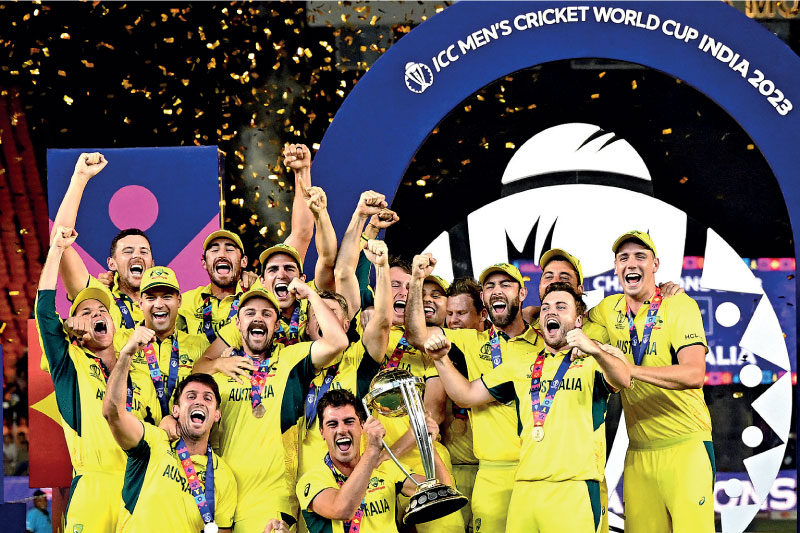Tuesday Feb 17, 2026
Tuesday Feb 17, 2026
Monday, 20 November 2023 00:01 - - {{hitsCtrl.values.hits}}

Australia’s players celebrate with the trophy after winning the 2023 ICC Men’s Cricket World Cup One-Day International (ODI) final match against India at the Narendra Modi Stadium in Ahmedabad on 19 November 2023 – AFP
 AHMEDABAD: Mighty India who carried all before them to the final of the Cricket World Cup were eventually humbled at the post when Australia spearheaded by Travis Head’s fourth ODI century cruised to their sixth title at the Narendra Modi Stadium in Ahmedabad here Sunday.
AHMEDABAD: Mighty India who carried all before them to the final of the Cricket World Cup were eventually humbled at the post when Australia spearheaded by Travis Head’s fourth ODI century cruised to their sixth title at the Narendra Modi Stadium in Ahmedabad here Sunday.
The 130,000 spectators who crammed the largest cricket stadium in the world were stunned into silence as Australia displayed the temperament at big games where they brought out their best cricket, which makes them better than any team. No Australian team ever is just a participant no matter how good the opposition is. They will compete as they showed yesterday.
The final was the crunch for India and the way they have been performing, there had to be an off day. Unfortunately, for them it came in the most important game of the tournament – the final. All what India carried before them came to naught with yesterday’s defeat that ended their streak of 10 victories.
For Australia, their Captain Pat Cummins lived true to his pre-final words: “There’s nothing more satisfying than silencing 1.3 lakhs people”. He certainly did that before triumphantly lifting the World Cup presented to him by Indian Prime Minister Narendra Modi and Australia’s Deputy Prime Minister Richard Marles, much to the chagrin of the home team India who had until yesterday played like champions and looked unstoppable.
The final nail on India’s coffin was put in by Glenn Maxwell who hit the winning two runs after Head, attempting to finish the match off in style holed out to deep midwicket for a glorious 137 scored off 120 balls (15 fours, 4 sixes), leaving Marnus Labuschagne unbeaten on 58 (110 balls, 4 fours).
 From the time Cummins won the toss and decided to put India in to bat first, Australia called all the shots. In fact, the toss played a crucial role because the dew set in during the Australian run chase and the Indian bowlers especially the spinners were handicapped by the wet ball.
From the time Cummins won the toss and decided to put India in to bat first, Australia called all the shots. In fact, the toss played a crucial role because the dew set in during the Australian run chase and the Indian bowlers especially the spinners were handicapped by the wet ball.
It seemed the Australians had done their homework well on India spending a lot of time with the analysts because there was a clear plan at play. They bowled short and into the body and asked the Indians to play pull shots on a slow surface not giving them the room to free their arms, and fielded brilliantly to dismiss the strong batting line-up for 240. It was the first time that India was bowled out in this tournament.
The game awareness and energy displayed by the Aussies was incredible. It seemed that there were more than 11 fielders on the field with no gaps. Every shot made by the Indian batters seemed to find a fielder. They cut down the angles, diving, sprinting and saving runs virtually curtailing the Indian run scoring. Josh Inglis was outstanding with five dismissals which is the most by a wicket-keeper in a World Cup final.
The early dismissal of Indian Captain Rohit Sharma in the 10th over prevented India from getting the pulsating starts they are capable of. Sharma was dismissed for 47 off 31 balls (4 fours, 3 sixes) and that saw Australia peg back the run rate with India going without a boundary for 97 balls, and then again for 70 balls that really put the brakes on the Indian run scoring.
The only noteworthy partnership was 67 off 109 balls between Virat Kohli (54 off 63 balls, 4 fours) and Lokesh Rahul (66 off 107 balls, 1 four). Their partnership between the two sides was the deciding factor in the league game, but it was not to be yesterday.
Kohli looked set for another century but Cummins got him to play onto his stumps to pick up one of the most important wickets of his career. Once the stand was broken it was a hard struggle. India never gained any momentum to put up a total which would have been out of reach of Australia.
Despite losing three early wickets for 47, Australia chased down the total with authority to finish on 240-4 to win with seven overs to spare, courtesy a fourth partnership of 192 off 215 balls between Head and Labuschagne. Labuschagne played the role of anchorman sealing off one end, while Head was the aggressor reaching his century off 95 balls (14 fours, 1 six) to become the seventh batsman to achieve that milestone in a World Cup final, emulating two other Australians before him Ricky Ponting (140) in 2003 and Adam Gilchrist (149*) in 2007. As for Labuschagne, being overlooked from the initial World Cup squad and then admitted in the last minute to come and play an innings of a lifetime, that too in a World Cup final, was some achievement by him. Head was named Player of the Match and Kohli, the Player of the Tournament.